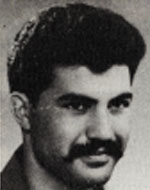Uri, son of Rachel and Rachamim Zigdon, was born on September 28, 1938 in Haifa, where he completed his elementary studies in his hometown and completed his high school studies at the Nahariya primary school. She was able to withstand the burden and gave it to his widowed grandmother, who became the central figure in his life, and replaced his father and mother in all respects. From his youth, Uri was accustomed to being independent, and he would go to school after his grandmother had left and left When he returned from his studies, the grandmother was still at work, and he was left alone for long hours and learned to occupy himself, and at that time his qualities of peace and restraint were crystallized, and Uri loved his grandmother and admired her for everything she did, In 1953 he came to Kibbutz Gesher Haziv in the framework of the young hachshara, where he completed his education and studied the mechanics profession. Uri was drafted into the IDF in late December 1955. After basic training and after completing a paratrooper course and a departmental medic course, he was assigned a combat medic and a mechanic driver in a paratroopers unit. During his service he participated in the battles of Operation Kadesh, and friends who served with him talked about him, who was so enthusiastic about fulfilling his duties that he missed no opportunity to volunteer for missions, and jumped in his head to any place of danger. Uri was open to ideas, and at the same time a little shy, and with great personal charm, but inside he was stormy, and stood out a lot about his way of life. At the end of his regular service, he returned to civilian life in his kibbutz and was sometimes called for periods of active reserve duty. He continued his studies in the field of garage management and vehicle appraisal, and at the same time worked in the various branches of the agriculture, concentrating on the management of the garage and even developing it and expanding it to receive foreign jobs. Among his students from Kfar Galim, Uri is remembered as a unique guide. He came to them in a storm on his motorcycle, “with a huge hair and a big mustache,” all confident and full of energy. “There was something intriguing about him, something different and different from previous guides, he did not rock at political lectures that bored the guys at that age, but turned in the more adventurous direction of” kumzitzim “and surprise trips, and Lev-to-Lev talks about the problems of Each of his pupils. ” They adored him for his stout appearance and sportiness, loved his mischievous smile, and appreciated his willingness to help, regardless of the energy he would have invested to do it for the best. He also danced. In 1965 Uri married his girlfriend Yardena, and in 1966 his eldest son, Barak, was born. In 1968 his second son Tzur was born, and in 1971 his son Shacham was born. Uri loved his children and his wife with all his might, gave them a lot of attention and warmth, and wrote about them in his diary. When he was on reserve duty or at work away from home, he would write to each of them letters filled with longing and love, and shared them with everything he had gone through. In 1973 he went with his family on a mission to Kenya for a year of work by profession. When he learned of the outbreak of the Yom Kippur War, he hurried to board a plane leaving for Israel. He wanted to be of help, to be at the center of the truly important matters. The plane would pass over Libya, but it was just a “small detail” in his eyes. In the Yom Kippur War, Uri participated in the battle against the Egyptians in Sinai.On the 24th of Tishrei 5734 (24 October 1973) Uri was killed and killed in the half-track, which entered with the first force into the city of Suez, and was brought to eternal rest in the Gesher HaZiv cemetery, leaving a wife and three sons. His commander: “Uri was a natural volunteer … a good friend, who was able to instill a comfortable atmosphere in the most turbulent situations … He is always on the front line, in the most difficult and dangerous place …” His kibbutz published a pamphlet in his memory and his wife immortalized his name in an iron sculpture From his work tools.
